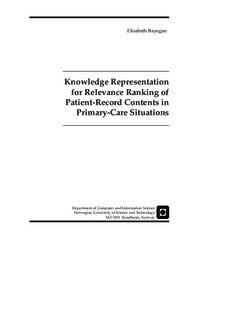| dc.contributor.author | Bayegan, Elisabeth | nb_NO |
| dc.date.accessioned | 2014-12-19T13:29:22Z | |
| dc.date.available | 2014-12-19T13:29:22Z | |
| dc.date.created | 2003-01-17 | nb_NO |
| dc.date.issued | 2002 | nb_NO |
| dc.identifier | 122133 | nb_NO |
| dc.identifier.isbn | 82-471-5539-7 | nb_NO |
| dc.identifier.uri | http://hdl.handle.net/11250/249689 | |
| dc.description.abstract | The computer-based patient-record system can play a significant role in physicians’ decision-making process by, for instance, presenting them with information they need from the record, relevant to care situations. However, the patient-record system’s contribution in decision making is often reduced to storing and presenting patient information as time-oriented logs of encounter events. As the record accumulates patient information over time, physicians loose overview over the contents, and the information becomes increasingly inaccessible for them.
Several realizations of problem-oriented patient records have attempted to structure the computer-based patient-record system. A persistent complaint against previous problem-oriented record systems refers to the way these systems compels the user to work. Despite less successful efforts, a problem-oriented view of data still offers a foundation for a well-structured patient record.
A knowledge-based patient-record system can support physicians during patient care in at least two ways; with a structure and a formalization that encodes information in the record system. A patient-record system with knowledge can reason about its content and use, and a process-aware system can recognize care situations and determine relevant information from the record to these situations. In this thesis, we present a way to represent knowledge for a Norwegian primary-care patient-record system. The knowledge representation enables encoding of record information—based on what primary-care physicians enter into it.
The knowledge-elicitation techniques that we have used in this thesis comprise: (1) an observation study of family physicians in clinical settings, (2) a study of patientrecord contents , and (3) a qualitative and a quantitative survey among family physicians regarding the use and the usefulness of the patient-record systems in patient care. Results from these studies, in addition to their inherent empirical values, lay a foundation for further work and contribution of:
• An information model that supports a problem-oriented view of patient data
• A process model of primary-care activities , their goals and purposes, participants involved in the activities , information needs , and interactions with the patient-record system
• An ontology of clinical concepts that classify and represent the patient-record contents. The clinical concepts are associated with activities in the primary-care process
The problem-oriented structure organizes the patient-record contents into medical problems . The ontology classifies the patient-record contents according to clinical concepts. Moreover, the association between clinical concepts and activities enables a ranking of information contents to care activities.
For a practical evaluation of the knowledge model, we have developed a prototype implementation that simulates encounter-specific processes. The results demonstrate that the prototype can identify and extract information from the record, relevant to the various activities in the process model.
When compared to time-oriented patient-record systems, the problem-oriented information model, in combination with the clinical concepts and their associations to care activities, enables a method for providing a better overview over and easier access to patient-record information. | nb_NO |
| dc.language | eng | nb_NO |
| dc.publisher | Fakultet for informasjonsteknologi, matematikk og elektroteknikk | nb_NO |
| dc.relation.ispartofseries | Dr. ingeniøravhandling, 0809-103X; 2002:144 | nb_NO |
| dc.relation.ispartofseries | IDI-rapport; 14/02 | nb_NO |
| dc.relation.haspart | Bayegan, Elisabeth; Nytrø, Ø; Grimsmo, A. Ranking of Information in the Computerized Problem-Oriented Patient Record. MEDINFO 2001 - Studies in Health Technology and Informatics: 594-598, 2001. | nb_NO |
| dc.relation.haspart | Bayegan, Elisabeth; Nytrø, Ø. A problem-Oriented, Knowledge-based Patient Record System. Health Data in the Information Society - Proceedings of MIE2002: 272, 2002. | nb_NO |
| dc.relation.haspart | Bayegan, Elisabeth; Tu, S.. The helpful patient record system: problem oriented and knowledge based.. Proc AMIA Symp: 36-40, 2002. | nb_NO |
| dc.relation.haspart | Bayegan, Elisabeth; Nytrø, Ø; Grimsmo, A. Ontologies for knowledge representation in a computer-based patient record. Tools with Artificial Intelligence, 2002. (ICTAI 2002). Proceedings. 14th IEEE International Conference on: 114-121, 2002. | nb_NO |
| dc.title | Knowledge Representation for Relevance Ranking of Patient-Record Contents in Primary-Care Situations | nb_NO |
| dc.type | Doctoral thesis | nb_NO |
| dc.source.pagenumber | 203 | nb_NO |
| dc.contributor.department | Norges teknisk-naturvitenskapelige universitet, Fakultet for informasjonsteknologi, matematikk og elektroteknikk | nb_NO |
| dc.description.degree | dr.ing. | nb_NO |
| dc.description.degree | dr.ing. | en_GB |
